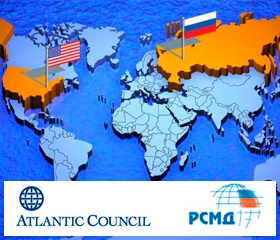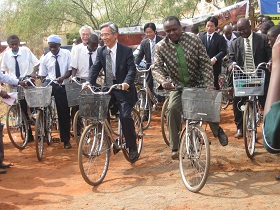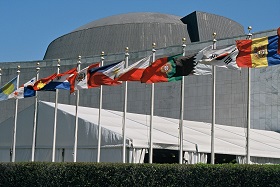Will NGOs Survive In the Future?
(no votes) |
(0 votes) |
Doctor of Political Science, Professor of the Diplomacy Department of the MGIMO University
A significant number of non-governmental actors can justifiably be regarded as an integral part of modern diplomacy, if by diplomacy we mean the communication system available to the international community. We have reason to claim that international NGOs, as important social institutions for the establishment and development of extensive contacts within multilateral diplomacy, help fill current gaps in unduly bureaucratized international politics.
A significant number of non-governmental actors can justifiably be regarded as an integral part of modern diplomacy, if by diplomacy we mean the communication system available to the international community. We have reason to claim that international NGOs, as important social institutions for the establishment and development of extensive contacts within multilateral diplomacy, help fill current gaps in unduly bureaucratized international politics.
The State and the Self-Organization of Society
When speculating about the future, many thinkers assumed that the state would die out. Marxists wrote about its demise under communism due to the self-organization of society. Radical liberals believed that the absolute primacy of economic relations would sweep away national borders and turn the world into one interconnected market. The formation of the modern state, or, new type state as theorists often call it, began during the Renaissance. It was assumed that the polity as a historical category would acquire other forms in the future. Today, however, states continue to exist and play an important role in international relations. The self-organization of society manifests itself in an increasing number of non-state actors.
Transnational actors [1], which include, in particular, international non-governmental organizations (NGOs) occupy a special place among these non-state entities. The development of capacity of NGOs is gaining momentum. By the beginning of the 20th century, more than one hundred pacifist public organizations had already been in operation in Europe and America. The governments of that time, just as their successors today, were suspicious of organizations that had no official status. Therefore, pacifists were not admitted to the Hague Conferences of 1899 and 1907 during which negotiations were held on disarmament and the laws of war.
The turning point came after World War I, when the League of Nations began to invite and consult NGO representatives at its meetings. In 1945 the United Nations Charter mandated the Economic and Social Council (ECOSOC) to make suitable arrangements for consultation with non-governmental organizations which are concerned with matters within its competence (Article 71). The Universal Declaration of Human Rights adopted by the UN in 1948, and the European Convention for the Protection of Human Rights and Fundamental Freedoms, developed by the Council of Europe in 1950, contributed to the promotion of non-state actors. In the early 1950s, international non-governmental organizations became a huge unexplored continent on the map of international relations.
During the second half of the 20th and the beginning of 21st centuries, the number of non-governmental actors dramatically increased, bringing about numerous types of transnational actors: third sector organizations, non-profit organizations, voluntary organizations, civil society organizations, social movement organizations, self-help organizations, etc. The abbreviation GONGO, often used by print media denotes, an organization which is set up by the government, but operates like a non-governmental one. In Russia these are generally referred to as just NGOs.
The Legal Status and Funding of NGOs

the Russian International Affairs Council on
mutually assured stability.
Igor Ivanov, Ellen Tauscher:
MAD About You
Over time, the necessity of defining the legal status of a non-governmental organization became apparent. Initially, the organization was considered an object for international relations only. Some legal scholars contested granting NGOs the status of a subject. In their view, the objective of these organizations was not to encroach upon national sovereignty, but instead to establish cross-border horizontal ties.
Discussions in the Council of Europe resulted in the adoption in 1986 of the European Convention on the Recognition of the Legal Personality of International Non-Governmental Organizations. In furtherance of the provisions of this Convention, the Committee of Ministers of the Council of Europe developed a document in 2003 entitled the Fundamental Principles on the Status of Non- governmental Organisations in Europe. It clarified the fact that the structure of NGOs must be democratic and not based on a vertical hierarchy, inherent in the military and some religious groups, secret societies, etc. An NGO is recognized international if it has at least two foreign members (individuals or organizations). It should be open to all who conform with the regulations of its activities. The NGO itself is an organization not aspiring to make a profit, although it is free to carry on any economic, business or commercial activity, on the condition that any profits are used to finance the pursuit of the common- or public-interest objectives for which the NGO was set up.
NGOs may solicit and receive funding from their associated members, subject to the generally applicable laws of the country where its governing body is located. Funding from the state should not restrict its freedom and independence in actions.
In accordance with Article 11 of the European Convention for the Protection of Human Rights and Fundamental Freedoms, the freedoms of assembly and association are recognized by all member-states of the Council of Europe. In most member-countries, this has resulted in the rapid growth of registered non-commercial organizations. In 2003, there were as many as 2-3 million of them, yet this figure does not even include numerous unregistered associations.
International NGOs as Actors of Network Diplomacy

Headquarters of the vast majority of NGOs are
located in the Western world. At the same time,
the activities of these NGOs are located mostly
in Africa and the Middle East, Asia, Latin America
and the Caribbean.
The multiplicity of international actors, information and digital revolution, and openness of the global space are leading to a gradual blurring of the lines between domestic and foreign policy. In many areas of international cooperation, NGOs occupy a niche where the state has been gradually losing its position.
The sheer complexity of multilateral negotiations on climate change, genetic engineering, environmental protection, inter-religious dialogue, and other issues have necessitated the involvement of experts, scholars, representatives of business and culture in negotiations. These participants are provided to a large extent by international NGOs engaged actively in informal diplomacy. The so-called track two diplomacy is gaining momentum. Professionals capable of establishing contacts, promoting cooperation, conducting informal negotiations and mediating during conflict resolution are arriving on the international scene. NGOs should be viewed as an essential component of soft power.
There is good reason to talk of a new style of diplomacy. The campaigns that accompanied negotiations on the prohibition of anti-personnel mines or the establishment of the International Criminal Court illustrate this development extremely well. The signing of the Arms Trade Treaty was initiated precisely by civil society organizations.
Granting UN consultative status to a growing number of NGOs testifies to the recognition of their role in international politics. As of 2011, the number of recognized entities numbered 3.5 thousand.
Of course, the increased role of non-governmental organizations in areas previously considered to be the private domain of official diplomacy requires creative political thinking and changes to many traditional attitudes. Some believe that professional diplomacy in future will deal only with issues of high politics, covering matters of international security and protection of national interests in their current understanding. Non-governmental diplomacy will help build alliances and coalitions in order to promote cooperation in the field of economics, environmental conservation, as well as humanitarian affairs. It appears that the very distinction between high and low politics will be quite relative.
There are many cases of synergies between official and unofficial diplomacy. It is not accidental that the prominent British researcher Brian Hocking has introduced the term multi-stakeholder diplomacy, implying the need for close cooperation between diplomats representing their sovereign countries and non-state sovereignty-free actors, as James Rosenau has characterized them [2].
Having joined the process, official diplomacy now can go beyond the scope of the routine bureaucratic system, and bridge the traditional gap between the public and private worlds. By expanding the range of contacts, diplomats will be able to gain better access to information and improve relations with politically fragmented centers of power.

Granting UN consultative status to a growing
number of NGOs testifies to the recognition of
their role in international politics.
It goes without saying that such network diplomacy requires new rules, conventions and norms. However, attaining these goals is a rather difficult task. Traditional diplomacy rests upon sovereignty while non-governmental diplomacy takes advantage of transformations in the concept of sovereignty. Negotiations carried out by NGOs, as a rule, are public and transparent. State diplomats regard confidentiality as an essential condition for achieving successful results during negotiations. However, NGOs themselves face the need for confidentiality when discussing sensitive issues, especially if openness can lead to undesirable and even tragic consequences.
The question that then arises in this regard is as follows: will NGOs in the future be able to operate without a comprehensive and elaborate legal framework that regulates their activities in the international arena? Apparently, much remains to be done in this sphere. As network diplomacy, defined by state and non-governmental actors working together, gains ground, the elaboration of these rules will have to be accompanied by a simultaneous updates to existing diplomatic norms.
Do NGOs Suffer from the “Sore Points” of Our Time?
As NGOs grow in number, problems related to their operational efficiency are growing. These organizations are often not free from corruption, nepotism, fraud, and bribes offered to elite representatives important for their activities. Corruption has a harmful knock-on effect on the reputation of a number of organizations, negatively affecting their credibility and level of trust among their sponsors and the general public. These negative developments are limiting the access to care for those who really need it. The question of transparency in NGO budget spending inevitably comes to the fore. A major Danish NGO DanChurchAid, striving for transparency of its budget, publishes an annual corruption report, which lists any scandalous cases of the previous year. “The most effective way to fight corruption is to expose it”, says DCA's humanitarian director Lisa Henry.
Data about NGO funding give reasons for worry too. Many of these organizations have very impressive budgets. But do the funding sources always adequately reflect the noble values enshrined in policy documents? Statistics show that nearly 56% of NGOs have at least one board member affiliated with the arms industry, and 54% of them have representatives from the tobacco industry. It is noteworthy that a significant share of NGOs (59%) also have representatives from the finance sector representatives on their boards.
Documents prepared by the Council of Europe emphasize the impermissibility of any geographical or national discrimination in HQ location decisions. However, today the headquarters of the vast majority of NGOs (72%) are located in the Western world: 36% – in North America and 33% – in Europe. At the same time, the activities of these NGOs are located mostly in Africa and the Middle East (35%), Asia (20%), Latin America and the Caribbean (5%), i.e. in the countries belonging to the majority of the developing world. Europe accounts for only 18% of the activities of NGOs, North America and Oceania – for 5%. However, the ethnic composition of NGO governing boards reveals only 8% of Africans and 14% of Asians, who, as rule, received higher education in Western universities. It can be assumed that the development of globalization and civil society in the developing world will result in changes to these figures.
NGOs and Civil Society in Russia
Jeremy Hobbs,and Director of ESADE's Institute
for Social Innovation, Ignasi Carreras, talk about
the future of NGO's
Against the background of uncertainty and unpredictability in international relations, Russia is aware of the need “to constantly exchange views and listen to ideas are expressed by non-governmental structures”. The emergence of new documents on foreign policy, stressing that the involvement of civil society in shaping foreign policy and the promotion of greater participation of NGOs in international expert and political science forums and dialogues is a natural process undoubtedly contributing to this.
The Foreign Policy Concept of the Russian Federation ascribes civil society actions to soft power – a comprehensive set of tools for solving foreign policy challenges using citizens’ associations, informational, communication, humanitarian and other methods and alternative practices from classical diplomacy.
Currently, there are 51 Russian NGOs that enjoy consultative status with the ECOSOC. However, this amounts to only 1.5% of the total number of NGOs worldwide with such a status which, of course, does not align with the role and place of Russia's civil society in the international arena. There are significant, though so far untapped, reserves of Russian citizens’ representatives for participation in international affairs.
Will NGOs Survive in the Future?
As the development of civil society in each country gains momentum and its role on the world stage strengthens, the number of organized NGOs will undoubtedly continue to grow. At the same time, it’s reasonable to expect the emergence of quite an impressive amount of amorphous civil society groups, created for specific political campaigns. Since the task of such groups is to shape public opinion, after achieving the set goals these groups will be dissolved. Time will tell if such a system proves effective and make our world a better place. As a popular Soviet author of the 1920s and 1930s Ilya Ilf once wrote in his notebook, “The most important thing in science fiction novels was radio. The happiness of mankind was expected from it. Well, we got the radio, but we haven’t got happiness.”
.
1. Non-State Actors in World Politics / Ed. M. Lebedeva, M. Kharkevich. Moscow, Aspect Press, 2013.
2. T. Zonova. Diplomacy. Models, Forms, Methods; Textbook. Moscow, Aspect Press, 2013.
(no votes) |
(0 votes) |




